
With treatment of chronic disease eating up health-care budgets, elected officials consider excise taxes to reduce consumption of harmful sugary beverages.
On Nov. 4, 2014, 76 percent of voters made Berkeley, California, the first U.S. city to pass a soda tax. After its implementation in March, the tax generated just shy of US$700,000 in revenue in its first six months.
Berkeley City Councilmember Laurie Capitelli helped spearhead the measure. At first, he saw the tax as little more than a revenue source. Then he saw a YouTube presentation on the toxicity of sugar by Dr. Robert Lustig, pediatric endocrinologist at the University of California-San Francisco.
In his 2013 book, “Fat Chance: Beating the Odds Against Sugar, Processed Food and Obesity,” Lustig discussed findings from his 2013 study on the relationship between sugar and diabetes prevalence across 154 countries over a 10-year period, during which worldwide diabetes prevalence rose from 5.5 to 7 percent.
“Every additional 150 calories per person per day barely raised diabetes prevalence,” Lustig wrote. “But if those 150 calories were instead from a can of soda, increase in diabetes prevalence rose sevenfold.”
Soda, energy drinks and sports drinks account for 36 percent of added-sugar intake in Americans, according to the United States Department of Agriculture.
“The science is in, I believe, and so I pivoted from looking for sources of revenue to looking for ways to, in fact, reduce consumption of what I consider to be a toxic substance,” Capitelli said.
As Americans get sicker—rates of both obesity and metabolic syndrome are pushing 35 percent in adults—Berkeley’s landmark legislation leaves the rest of the country wondering: Could taxes turn the trend around?
No comments:
Post a Comment